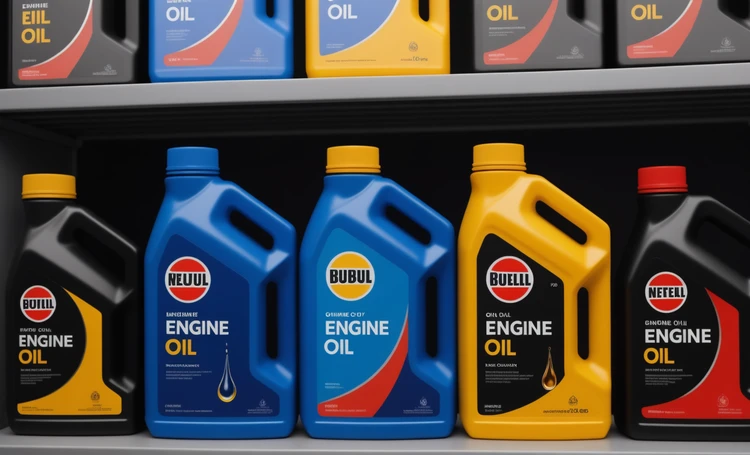🚗 How to Choose the Right Automotive Oil?
Choosing the right motor oil for your car is a key aspect of ensuring its longevity and efficient performance. The wrong choice can damage the engine and increase repair costs. In this article you will find useful tips and recommendations on how to choose oil for your car, and also here you will find high-quality oils for your car.
🧐 Why is Choosing the Right Motor Oil Important?
🌍 Impact on performance and durability
Properly selected motor oil provides optimal lubrication of the engine, which significantly affects its performance and longevity. It protects the engine from wear, overheating and contamination.
💡 The role of oil in engine operation
Motor oil performs several key functions: lubricates moving parts, prevents corrosion, cools the engine, cleans contaminants, and maintains seals.
📊 Impact on efficiency
High-quality oil also helps reduce fuel consumption and reduce emissions of harmful substances into the atmosphere.
📌 What Factors to Consider When Choosing Motor Oil?
🔍 Oil viscosity
One of the main parameters of oil is its viscosity. It is determined according to the SAE (Society of Automotive Engineers) system and is indicated on the packaging, for example, as 5W-30. The first number indicates the viscosity of the oil at low temperatures (W – winter), the second – at high temperatures.
💬 Car driver manufacturer specifications
Always follow the vehicle manufacturer's recommendations regarding oil type. This information is contained in the vehicle owner's manual.
🌐 Quality standards
There are various quality standards for motor oils, such as API (American Petroleum Institute) and ACEA (Association des Constructeurs Européens d'Automobiles). Choose oil that meets these standards.
🚀 Synthetic vs Mineral Oil
🧪 Synthetic oil
Synthetic oil provides better protection and performance over a wide temperature range. It is highly stable, reduces friction and is more durable, but it also costs more.
🌿 Mineral oil
Mineral oil is suitable for older or classic cars and is a more budget-friendly option. However, it requires more frequent replacement and does not provide the same level of protection as synthetic ones.
🔄 Semi-synthetic oil
Semi-synthetic oil is a compromise between synthetic and mineral, combining their advantages. It is suitable for used cars and provides a good balance between price and quality.
🛠 Additional Factors When Choosing Oil
🌡 Temperature Conditions
Choose an oil that suits the climate conditions of your region. If you live in an area with cold winters, preference should be given to oil with a low first number in the label (for example, 5W).
🚗 Vehicle type and age
The type and age of your vehicle also plays an important role in your oil choice. For new cars, synthetic oils are better, while for older models, mineral or semi-synthetic oil may be suitable.
💼 Frequency and driving style
If you frequently drive short distances or in heavy city traffic , choose an oil that is resistant to oxidation and deposit formation.
📋 Table: Selection of Motor Oil By Vehicle Type
| Car Type | Recommended Oil | Note |
|---|---|---|
| New cars | Synthetic | Provides better protection and durability |
| Cars with high mileage | Semi-synthetic | A balanced choice between quality and price |
| Old/classic models | Mineral | Suitable for older cars |
💬 Frequently Asked Questions about Motor Oil
❓ Is it possible to mix different types of oil?
It is advisable to avoid mixing different types of oils, as this can reduce their effectiveness and lead to unpredictable consequences.
❓ How often do you need to change engine oil?
The frequency of oil changes depends on many factors, including the type of oil, vehicle operating conditions, and manufacturer recommendations. On average, this happens every 10,000 – 15,000 kilometers.
❓ Does oil affect fuel consumption?
Quality motor oil can improve engine efficiency and, as a result, reduce fuel consumption.
📚 Basics of Understanding Motor Oil Labels
🏷 API and ACEA Standards
API markings (e.g. SN, SM) indicate the oil's performance level and protective properties. ACEA (eg A1/B1) provides additional information on oil performance, including compatibility with certain engine types and emission standards.
🌟 Energy Saving Oils
Energy-saving oils are identified by special symbols and are designed to reduce fuel consumption and reduce harmful emissions.
🛢 Features of Various Additives
Oil additives such as antioxidants, wear additives and detergents improve oil performance, extend engine life and protect the engine from corrosion and deposit build-up.
📈 The Importance of Regularly Changing Engine Oil
🔧 Maintaining Engine Health
Regular engine oil changes are critical to maintaining engine health. It prevents wear, reduces friction and improves overall engine performance.
🕒 Avoiding Long-Term Problems
Delaying an oil change can lead to serious and costly problems, including engine damage and reduced engine efficiency.
🌱 Environmental Consequences
Regular oil changes also help reduce harmful emissions, which is important for preserving the environment.
🚀 Conclusion: The Importance of Choosing the Right Motor Oil
Choosing the right engine oil is key to the longevity and reliability of your vehicle. It ensures optimal engine performance, reduces fuel consumption and extends its service life. By considering all of the above factors and tips, you can make an informed choice that will provide your vehicle with maximum performance and protection.



